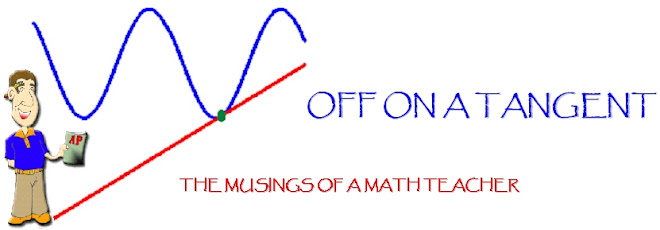 Are students today different from students 5, 10, 20, 2400 years ago? Is the teaching profession any different? Well, calculus (the study of change) would confirm that "yes," both have changed (and I'm not just talking about falling calculus test scores.) In my 10 short years in the teaching profession, I have seen more change than a Texan observing the weather on any given day. Consequently, my own methods have been flexible, as I've had to accommodate new mandates, attitudes, and work ethics.
Are students today different from students 5, 10, 20, 2400 years ago? Is the teaching profession any different? Well, calculus (the study of change) would confirm that "yes," both have changed (and I'm not just talking about falling calculus test scores.) In my 10 short years in the teaching profession, I have seen more change than a Texan observing the weather on any given day. Consequently, my own methods have been flexible, as I've had to accommodate new mandates, attitudes, and work ethics.My first year of teaching came after 2.515 years as a successful residential construction manager. I was uncertified and without experience in a classroom (beyond my years as a student.) I swallowed hard that first day as the tardy bell rang for first period. I stared out at my incredibly young and immature-looking freshman class of Algebra I students. I don't know who was more nervous at that moment: them or me. As soon as I began to speak, I felt energized and comfortable. I knew in an instant that I was meant to be in a classroom. I still remember the very special relationships I made with those students that first year, many of who were low socio-economic and minority subgroups. Many students struggled to learn, but nearly ALL of them were willing, and they worked very hard. Because I truly cared for them, it showed, and they felt it. I joked around with them, and asked them about their interests, hobbies, and families. It wasn't long before we had developed a mutual respect, and MANY of these kids were starving for a positive role model. It was almost as if they WANTED to work for me, not wanting to let me down.
The very next year, I began teaching what I was hired to teach: PreAP Precalculus and AP Calculus. Still teaching on an "emergency permit," letters were sent home to my students' parents informing them that "an uncertified teacher is instructing their students." The letter mentioned nothing about my expertise in math obtained through my BS in Mathematics from UT (with distinction.) We all got a good laugh in class about my "uncertified-ness" every time I made a careless mistake, like adding 5 + 7 incorrectly (addition is actually something I've not very good at, but luckily, I'm NOT an accountant!)
This new batch of calculus students I was teaching was dramatically different than the Algebra students of just a year ago, with totally different needs and ambitions. I went from teaching students who struggled with the concept of a negative number, to students who were now contemplating what negative numbers raised to imaginary powers were. From students who wouldn't know the difference if I added 5 + 7 incorrectly, to students who were all too quick to point out if I left off a "dx" at the end of a definite integral.
I still taught Algebra I and II in summer school while teaching the precalculus and calculus during the regular academic years, so I always stayed grounded in the vast range of student abilities. One thing that both levels of students appreciated was free money (and my humorous style of teaching . . . .so that makes two things, I guess.) Actually, I realized that in any case, students will always be willing to work for teachers they like. So how can a teacher ingratiate himself to his students? Like them. Treat them with respect. Give them in the individual attention they crave. Humor them. Speak to them passionately, enthusiastically, and with conviction. Students, especially the ones who have struggled with math and school their whole lives, will turn away from a Dry, strict, taskmaster of a teacher faster than someone recoils after smelling a stinky sock.






1 comment:
Although I tend to agree with your assessment of declining student achievement it is a struggle to keep things in perspective. I wonder, at least in my case, is it just a bunch of old guys complaining about the younger generation. We all can remember those family get togethers where our parents, aunts and uncles wondered aloud what has happened to the younger generation while we wondered how they could be so out of it. (Whatever it was) In many ways I am now them. I do believe one thing has changed from my generation. That is the lack of intellectual curiousity of our students. I don't know if it is because everything is so easily obtained and therefore taken for granted or they simply have no interest in my chosen fields of math and science. In any event I hope enough are interested to maintain the technological marvels this country has been able to produce.
Post a Comment